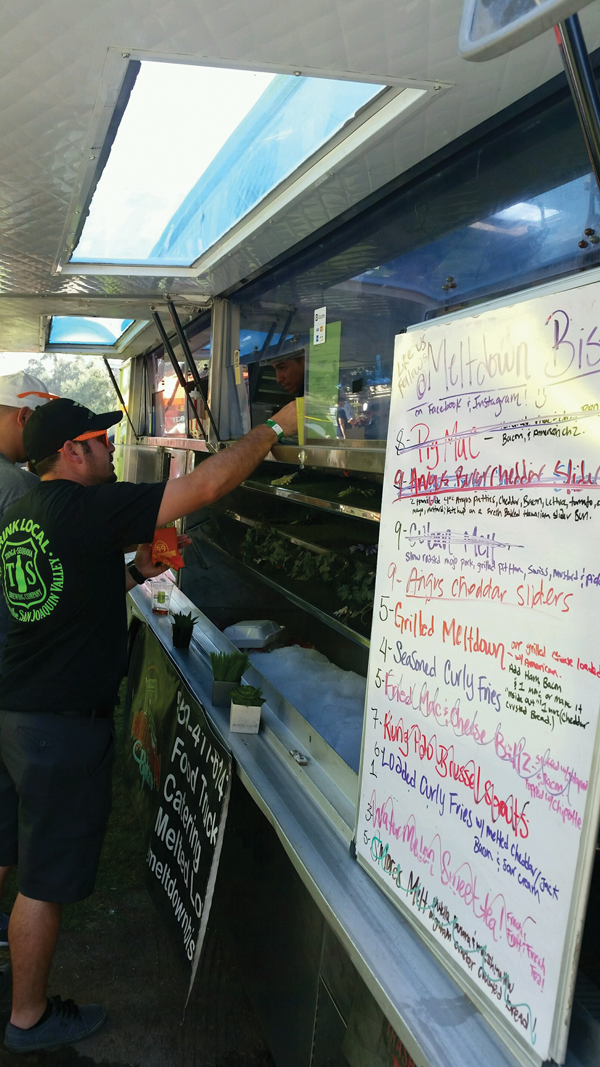City Council still concerned that gourmet food trucks will hurt downtown restaurants by offering cheaper prices
By Reggie Ellis
@Reggie_SGN
VISALIA – Balancing the need for new entrepreneurial ventures and existing businesses has proven to be quite complicated. But it’s hard to pinpoint laws that benefit both when one business is a moving target and the other is tied to a single location.
It’s been nearly a year since the Visalia City Council attempted to draw up an ordinance to regulate food trucks that have menus more diverse than tacos but can’t spend more than 10 minute in one place unless they want to invest in a parking lot with bathrooms. And after its Feb. 5 meeting, the City Council is still struggling to cook up the right set of rules to allow food trucks to pull up to customers without pulling customers from nearby restaurants.
Last summer the City formed a Mobile Food Truck Task Force to weigh in on the issue.
The task force was set up to be a cross section of stakeholders including food truck operators (Miguel & Mikayla Reyes, Quesadilla Gorilla, and Kerran & Florine Green, Kerribb Flava), a restaurant owner (Craig Van Horn, A&W) along with a member from the Chamber of Commerce (Dante Rosh), a representative from the Industrial Park (Lowell Richardson), and a representative from the Visalia Mall (Rick Feder). The group also did outreach with other key groups including Downtown Visalians, Visalia Economic Development Board, Downtown Property Owners Association, and the Tulare Kings Hispanic Chamber and came up with several options for the Council to consider including:
• Creating to new overlay districts allowing food trucks to operate on Main Street and in the industrial park;
• Setting hours from 5:30 a.m. to 7 p.m. with hour long breaks between breakfast (9:30-10:30 a.m.), lunch (2-3:30 p.m.), and dinner;
• Requiring a minimum distance of 150 feet between food trucks and restaurants and 50 feet from a building while parked on private property;
• Requiring trash bins and clean up before leaving the site;
• Prohibiting the sale of alcohol and playing music;
• And requiring food trucks to register their business annually as well as display a placard as proof of registration.
Councilmember Steve Nelson questioned how the business license, distance and hours of operation will be enforced. “Restaurant owners are very concerned,” Nelson said. “Gourmet food trucks are going to pull people away from an established business because they can sell it cheaper.”
Councilmember Phil Cox agreed, “Downtown is not comfortable with this. I’m not a huge supporter of the 150-foot distances, that’s just two lots away. I am supportive of 300 feet, a block or more away. I might consider it then.”
Cox also questioned hours of operation which began at 7 a.m. and ended at 7 p.m. with hour breaks between breakfast, lunch and dinner blocks. Councilmember Greg Collins said ending them at 7 p.m. was far too early for people looking for food as they leave the movie theater or a brewery at 10 p.m., when most restaurants in downtown are closed.
“I think we should extend the hours to midnight,” Collins said.
Vice Mayor Bob Link suggested having different hours for the “entertainment” portion of Main Street from Santa Fe to Ben Maddox versus the “service” area from Ben Maddox to Mineral King. He said hours near the theater and breweries should go until 10 p.m. but could end at 8 p.m. east of Ben Maddox.
Andy Chamberlain with City Planning said the task force shared the Council’s concerns about protecting brick and mortar businesses which are heavily regulated, well established and have a much higher overhead cost than mobile vendors. He said both types of businesses agreed that Visalia should have a commissary, a central kitchen that prepares uncooked food safely before being packed into food trucks to be cooked to order. Chamberlain also said that curbside vending would not work for downtown because of the angled parking.
Mayor Warren Gubler asked about requiring food trucks to be on-site at a brewery. He used Barrelhouse pub as an example, which uses an outdoor area behind the building for food trucks to park and sell only to Barrelhouse customers. Chamberlain said that was a unique situation for which Barrelhouse included in their conditional use permit prior to opening.
Gail Zurek, executive director of the Visalia Chamber of Commerce, cautioned the Council against using a 15 minute time limit because most food trucks are moving toward higher quality food. “The food truck movement is going away from the roach coach,” she said. “They are serving new food that is not a quick vend.” She suggested sending the item back to the task force to work out the details.
City Manager Randy Groom narrowed the focus for the revisions to creating three overlay districts — including the industrial park and two on Main Street, one between Santa Fe Street and Ben Maddox Way, and the other from Ben Maddox to Mineral King Avenue – and increasing the distance between food trucks and restaurants to 300 feet.
Councilmember Steve Nelson motioned to table the item and have staff make the changes suggested by Groom before coming back to present a new version of the ordinance on food trucks in the industrial park and along Main Street. The motion passed 4-1 with Councilmember Greg Collins the lone dissenting vote.
